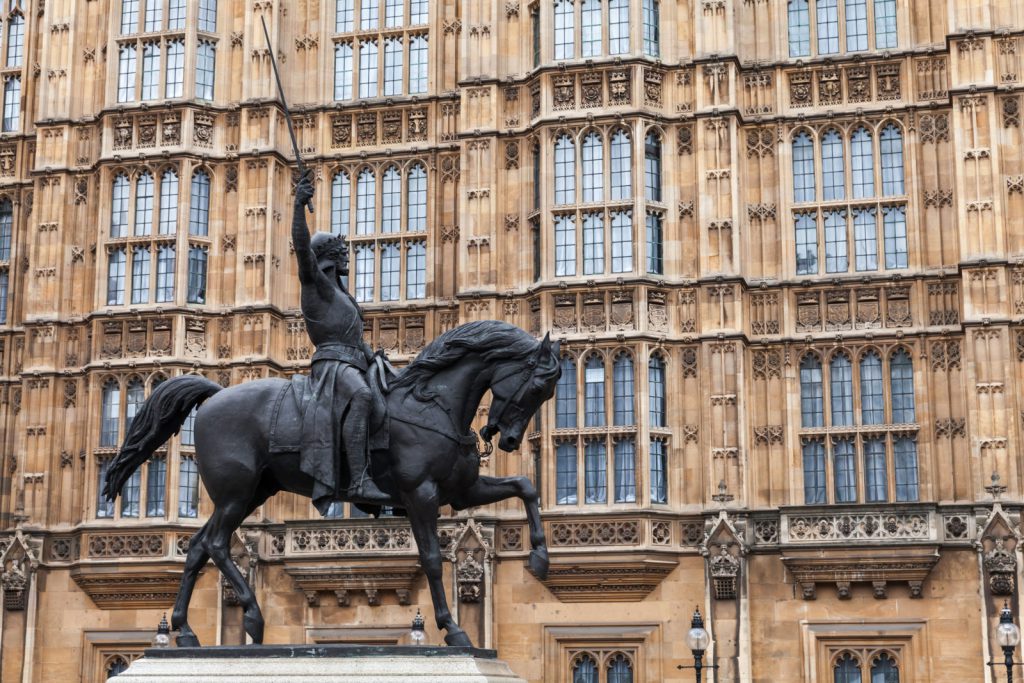
Published December 18, 2017
Editor’s note: This essay is adapted from a lecture delivered by Sir Roger Scruton at the second meeting of St. John’s University’s Center for Law and Religion’s Tradition Project that took place in New York on November 2-4, 2017.
The concepts of tradition, culture, and citizenship have this in common – they are summoned to protect our political inheritance against the disintegrative forces to which it is now exposed. They are tenuous, fragile, subject to many interpretations, and bend or break when we place too much weight on them. But they are among the important assets we have, when it comes to opposing the view of society as simply a power struggle between groups, who have no other end than to gain the ascendancy over their rivals. That view of society, as a power struggle, whose aim is domination or the escape from it, has been an intellectual commonplace from Marx to Foucault and beyond. Its falsehood is best displayed by examining the three concepts that form the topic of this article.
Tradition
When we justify a practice as traditional, what are we doing and when are we justified? We should distinguish trivial from deep traditions. There are traditions like highland dress, the ‘ceremony of lessons and carols’, Christmas itself, which pretend to be immemorial, when in fact they were invented in recent memory. We could dispense with them and not lose a cornerstone of our social life; and they will be blown away without our really noticing the fact (not perhaps Christmas, but what is now displayed as Christmas).
In contrast to those shallow traditions there are the deep traditions, customs, and institutions that define what we are, for others and for our selves. We may not be consciously aware of these traditions, but they determine our primary responses, what we do and how we do it, when reacting to others around us.
First among those traditions for us in the Anglophone community is the Common Law. This is the legal system in which principles are derived from particular judgments, rather than deduced from some higher principle: the principles of common law are a kind of sedimentation left by the resolution of conflicts. Such law offers a paradigm of practical knowledge: not contained in a single head but implicit in the procedures of the court and the feelings of the people. We enter the courtroom with the sense that the law exists already, and remains to be discovered, and that the judge is simply applying to the case before us the rules that we learned as a child. (cf Hayek, Law, Legislation and Liberty.)
Other examples of deep traditions: political procedures and the dignities of office. Traditions act as constraints on behaviour in which social membership is recognized and given its due. They are ways of acknowledging that the others to whom we belong are present, even in the acts that we perform in private.
More examples: religious liturgies, formalized expressions of loyalty or grief, taking vows, all the ways in which ritual takes over, telling you that what you are doing is not done only by you, and that your choice must be sanctified by the community.
There are also deep conflicts of tradition: for example, between common law and shari’ah, which tells us that law comes from above, not from below; between the face-to-face society and the society in which women cannot enter the public space unless behind a veil, so that their private space still surrounds them. These are existential conflicts, and bound in the long run to be dangerous. For us the face is all-important, the sign of open dealings and the duty to appear as an individual, face-to-face with the other who is face-to-face with you.
Culture
Three areas of human life compete for this label: common culture, high culture, and popular culture. All involve residues of social knowledge, but not all are equally valuable to us.
Common culture consists of the customs, values, and traditions that define a community and hold it together as a ‘we’. High culture is the self-conscious and reflective part of the common culture: the philosophy, historical narrative, and art that form the mirror in which the community polishes its face. High culture is taught, common culture acquired. By far the most significant part of common culture is the inherited religion; but in the modern world there are communities emerging without that foundation, struggling to define themselves with no reference to the divine. It is an open question whether they can succeed in this.
Popular culture is the sphere of popular entertainment, which in our time is increasingly commercialised, and dominated by the idolisation of celebrities, which is also of a piece with the desire to destroy them – to offer them as sacrifices, like Princess Diana.
One difficulty for us is that the three forms of culture have come apart, with high culture looking askance at a degraded popular culture, and also striving with great difficulty to hold the fragments of an inherited common culture in place. Yet a common culture of some sort is needed as a foundation of citizenship. If there is no ‘we’ there can be no cooperative engagement in the business of government, but only a scramble to grab its benefits. However, popular culture often wars against citizenship, on behalf of other collective ways of being. When entertainment takes over we become passive recipients of distracting pleasures, and the celebrity, rather than the legal ruler, is looked up to as the one in charge.
Our common culture has a Judaeo-Christian root; but we are maintaining it in being even though it has been uprooted, like a tree in a tank of nutrients. This has become vividly apparent, now that we are in conflict with another common culture – that of Islam – in which religion remains the firm foundation, but which seems not to be able to generate a reliable form of citizenship. (My Muslim friends dispute this, and I hope they are right.)
Citizenship
By citizenship I mean a specific form of communal life, which is active, not passive, towards the business of government. The citizen participates in government and does not just submit to it. Although citizens recognize natural law as a moral limit, they accept that they make laws for themselves. They are not just subjects: they appoint the sovereign power and are in a sense parts of that sovereign power, bound to it by a quasi-contract which is also an existential tie. The arrangement is not necessarily democratic, but is rather founded on a relation of mutual accountability.
The distinctive and demanding nature of citizenship can be understood through the contrast with Islamic society, in which the important laws are laid down by God, or deduced from the hints that he has given. Despite elaborate and beautiful systems of jurisprudence, Islamic law seems never to adapt in time to changing circumstances, since nobody has the authority to cancel it or replace it with a more fitting and man-made substitute. (Again, this is disputable, and I stand to be corrected.)
Citizens are accountable as individuals, not as members of groups, and their rights and duties are benefits and burdens to the individual: this principle is the core of enlightenment individualism, and crucial to many conflicts in the modern world. (Does someone have rights as a woman, a black, a gipsy, a homosexual, etc., or only as one individual among others?)
The Culture of Citizenship
Citizenship can only exist and flourish under certain cultural conditions. It requires a civil society distinct from, not absorbed into, the state, in which free associations of individuals create the conditions for mutual accountability. It requires a certain kind of education in which accountability is made central to what is taught. And it requires the cultivation of certain virtues – patience, tolerance, respect for law and promise keeping, and the ability to renounce even one’s dearest wishes for the sake of agreement.
Citizenship is today threatened by certain aspects of popular culture that valorise transgression and which promote (as does pornography) the treatment of people as commodities. It is also threatened by the decline of the human habitat. A citizen (civis) is naturally at home in a city and a city is a settlement and a shared home, built on dedicated ground. Modern architecture, which annihilates streets and façades and punctures the skyline like an unruly fist, is an assault on the city, a triumph of instrumental over intrinsic values, and a prime cause of the unsettled psyche of the people who live with it. However, it is an instructive example of how a high culture goes wrong (namely when colonised by egomaniacs) and how it could be put right again, by listening to the people.
The Common Culture of Accountability
The Enlightenment vision of the individual is implied in our modern concept of citizenship. Individuals are sovereign over their own lives, shielded by their rights and summoned to their duties, and living by mutual agreement among others of their kind. Human beings are not born in this condition: they must be educated into it. They must be taught to settle conflicts by negotiation and compromise; they must be taught respect and also renunciation of certain desires.
My own view is that there is a philosophical foundation for this vision far older and far deeper than that presented by the Enlightenment. It is based in the ‘I-Thou’ relation that lies at the heart of human communities, and which lifts the self-conscious person out of the state of nature so as to be a light above the turmoil. The Judaeo-Christian idea of neighbour love, as explored in the original statement in Leviticus and expounded in the parable of the Good Samaritan, is an expression of this ‘I-Thou’ relation. But neighbour-love makes sense only if there is also a neighbourhood in which it can be freely and safely exercised. We can base our civil obligations on neighbourhood only if we can share a place, protected by all of us, which establishes the boundaries within which negotiation is to prevail over force.
That point is politically incorrect, and is therefore all but unmentionable in the crises that we are living through. The Terrorist migrant may have no idea of obligations that grow from a place, or of a law that can be valid merely because it was made by the people of that place and is legitimate regardless of what God has commanded. The task of explaining this idea to the new wave of immigrants has not been undertaken, but on the contrary scorned, by our liberal elite.
Nevertheless, accountability and national loyalty have grown together. When detached from each other they both dwindle, as we have witnessed under the well-meaning jurisdiction of the EU. One significant cause of the Brexit vote was that many ordinary people, whose loyalties depend on neighbourhoods, could not tolerate the idea of being governed from elsewhere, by people who have no respect for boundaries.
The High Culture of Accountability
The individual is not only at the heart of our legal order. He and she have been the heroes and heroines of our literature, from Antigone to Ulysses. We are drawn through art to the one who has taken on the full burden of individual existence, even to the extent of being condemned by this to death, like Antigone.
We mistake the Enlightenment if we think that it emphasizes individual responsibility and self-fashioning for the first time. The literature of chivalry addresses the same existential questions as Shakespeare, Milton, Racine and the Augustan poets. The first gesture of God towards the newly created Adam was to load him with obligations, to put him to the test as an individual, and to watch in dismay as Adam did exactly what his nature demanded of him, which was to pay the cost of being himself.
Our high culture has reinforced the common culture of accountability and neighbour-love, and presented angelic visions that redeem the faults that we are bound to make, as we stumble towards extinction.
The Popular Culture of Transgression
Popular culture has for some time warred against our civil inheritance. There seem to be a variety of causes of this:
- The rise of dependency as a way of life and a mode of reproduction. The welfare state has produced an underclass for which accountability is seen merely as a cost, and an avoidable cost. You do not account for your life to others; you present them with a bill and ask them to pay for it. The individual is not, in this new world, to be tried by life. Rights can be obtained without acknowledging duties, and if you want something there is surely, in some bureaucratic document, the proof that you have a right to it.
- Sex has become a transaction, divorced from existential ties, with children as an accidental by-product of the principal aim, which is pleasure. Children may have a monetary value, since welfare benefits are calculated to take account of them. But they exist on sufferance and, as Hillary Clinton said, abortion is ‘sacrosanct’.
- Out of this has grown a generation of half-socialised children, insecure, not knowing what they belong to, and searching for a group identity that they can affirm as their own, preferably against the old order that has so manifestly betrayed them.
- Hence the problems that so trouble us: the culture of repudiation, the policing of the past, as a sin to be exculpated, the attack on free speech and the creation of safe spaces in which the snowflakes can congeal to an icy weapon, rather than melting ignominiously away.
Popular Culture and the Crowd
Crowd emotions are distinct from individual feelings about things that affect us and which we strive to understand. They come in from outside, and are welcomed because they sweep away all guilt and liability. This is the cause of scapegoating, and of genocide. (Though Girard has profound things to say about scapegoating which are relevant to the understanding of popular culture today.) Here we are returning to the primordial condition of the hunter-gatherer, and popular culture has been rapidly sinking to that condition, with ape-like music amplifying the desire to melt into the crowd and escape from the ordeal of being me.
This effect is amplified by social media, which create a new sphere of judgment. People used to be judged by God, and by lesser figures arranged on a hierarchy of authority and knowledge, with God at the summit. Now they are judged by their peers, and urged to conform to world-wide networks of opinion, which are not really networks of opinion since nothing is subjected to examination long enough to raise the question of its truth.
In the tyranny of crowds, citizenship has no place. The maxims of the citizen are ‘Hesitate!’ ‘Negotiate!’, as well as Nemo iudex is causa sua, audi alteram partem (no-one should be a judge in his own cause, hear the other side) and other such procedural strictures which we know as natural justice. Take those strictures away and there remains no real distinction between accusation and guilt. The maxims of the crowd are ‘Forward!’ ‘Unite!’ and ‘Death to the Enemy!’
Under the impact of crowd emotions mediating institutions lose their independent force, as we saw in the 20th century and are seeing again, as politicians appeal directly to the people with the language of ‘with us or against us’, ‘love or hate’. In matters to do with sexuality we have seen that fair trials are impossible, and witch hunts generally preferred.
Pop music and the pop festival, from Woodstock to Glastonbury today, have promoted this development. The Dionysian release of mass emotion, the collective ‘we’ that permits everything and overwhelms the timid I and you, is the central episode in popular culture, and the prescient remarks of Allan Bloom, in The Closing of the American Mind, did nothing to armour our society against this.
Conclusion
Is there a way back? I want to say that there is. The history of America suggests that, from the very beginning, citizenship has been wrested from an alien culture of divine laws, witch-hunts, and crowd emotions, which we British were fortunate enough to expel to these shores four centuries ago. The work of rescuing a viable society from the death-devoted puritans was made possible by the growth of territorial attachment and the tradition of common law, which tells us that law exists to resolve conflict, and not to impose God’s will. Those two great assets have been celebrated in the high culture of America, and in the art and literature which have made the fact of being here, whether on the Mississippi River or in Washington Square, among people whom you do not know but whose lives and aspirations you must respect, and with whom you must work out a shared life by agreement, into the foundations of a great experiment in self-knowledge.
Sir Roger Scruton is a Senior fellow at the Ethics and Public Policy Center, Senior Research Fellow at Blackfriars Hall Oxford and visiting Research Professor in the Department of Philosophy at the University of St Andrews. Some select titles of his include Soul of the World, The Face of God, Sexual Desire, The West and the Rest, England: An Elegy, News from Somewhere, Gentle Regrets and I Drink Therefore I Am.
Most Read
EPPC BRIEFLY
Sign up to receive EPPC's biweekly e-newsletter of selected publications, news, and events.
Upcoming Event |
Roger Scruton: America
SEARCH
Your support impacts the debate on critical issues of public policy.
Donate today







